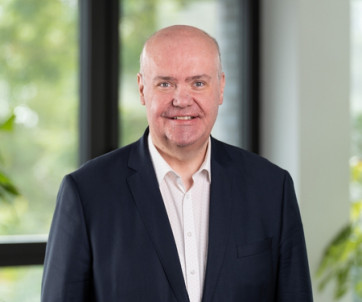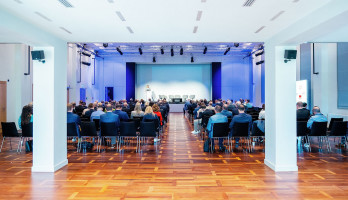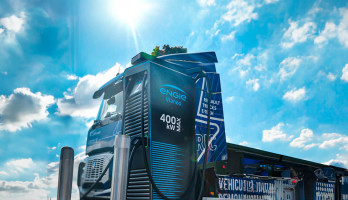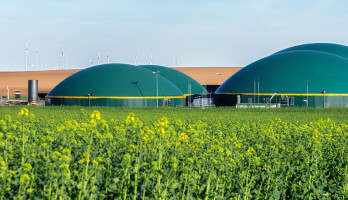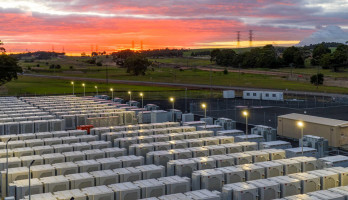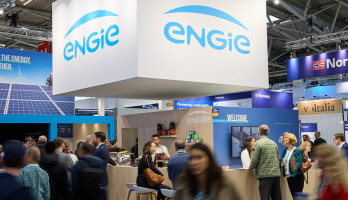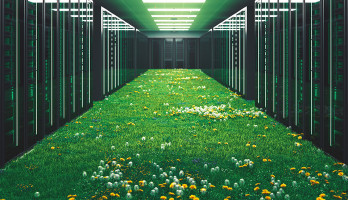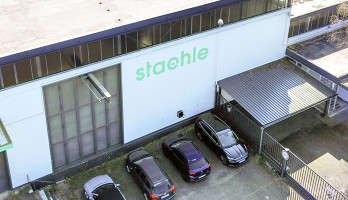
Impulse #26: Biomethane as a game changer
Green molecules, especially biomethane, are a game changer on the road to a successful energy transition. Eric Stab is convinced of this: in the new "Impulse" editorial, the CEO of ENGIE Deutschland AG explains the background and not only describes how ENGIE is already using biomethane to great effect in projects. He also highlights the direction German politics should now take.
"Biomethane offers enormous potential for a climate-neutral economy. We at ENGIE are actively driving this transformation forward."
Dear readers, are you already following ENGIE Deutschland on LinkedIn? If not, I would like to invite you to join our channel. If you are already a follower, you will have noticed that one topic in particular has caught your eye in recent weeks: there is a lot going on in the ENGIE universe when it comes to green gases. For example, we are now certified as a trader of sustainable biomethane in accordance with the International Sustainability & Carbon Certification (ISCC) – and thus guarantee through an external testing agency that we comply with the sustainability criteria for the production of biofuels from biomass required by the European Union's Renewable Energy Directive. This increases transparency for our customers and enables comparisons between traded biomethane certificates and physical evidence throughout the entire supply chain. On the other hand, ENGIE recently became a biogas partner of the German Energy Agency (dena). This project aims to connect players along the entire biomethane value chain and actively shape the market for biogas feed-in – and ultimately establish biomethane as an integral part of the future energy mix in Germany.
Biomethane, the underestimated energy source
Both ISCC certification and our commitment as a biogas partner of dena are very important to ENGIE and are central components of our strategy. This is because we consider green gases, including hydrogen as well as biomethane, to be a key lever for the transformation of the energy industry. Why? Well, in my view, biomethane is a largely underestimated key factor for the green energy future. Biomethane is renewable, comes from domestic resources, and is immediately available. The energy source is "made in Germany/Europe" and, as such, is available regardless of weather and time of day and can be stored, meaning it can be used seasonally and flexibly. Another important advantage is that biomethane can be used directly and without any necessary conversion costs in existing infrastructure and applications, whether gas networks, storage facilities, gas-fired power plants, industrial processes such as heating, or end-user appliances ranging from gas boilers to CNG/LNG vehicles. Furthermore, this green gas can play a role in all sectors, even in areas that are difficult to decarbonize: In high-temperature industrial applications, it can be used for the decarbonization of large parts of the heating sector, for example in municipalities where the expansion of electricity grids or district heating systems is particularly costly and complex, and in the transport sector, such as in aviation, shipping, or heavy-duty vehicles. What's more, the production of biomethane contributes to regional value creation in rural areas by enabling both waste recycling and the provision of the fermentation product as a biological fertilizer. Incidentally, CO2 is separated during the processing of raw biogas into biomethane. Since this can be used as a material or stored, negative emissions can be achieved here. In short, all these properties make biomethane an important building block for security of supply, climate neutrality, and a cost-efficient energy transition.
The untapped potential of biomethane
Considering the enormous potential of biomethane, it is surprising that the expansion of corresponding plants in Germany is currently stagnating. The same applies to hydrogen, although biomethane is already available today at significantly lower costs than green hydrogen and is therefore, in my view, a step ahead in a direct comparison. Nevertheless, according to dena, German biomethane production is stagnating at around 10 terawatt hours. The potential, on the other hand, is estimated at at least 146 terawatt hours – according to the consulting firm Guidehouse and the European Biogas Association (EBA), Germany has the greatest potential for biomethane production in all of Europe, even without the use of energy crops. Nevertheless, other European countries such as France and the Netherlands are already one step ahead of us. Why is that? As is so often the case, the answer can be found in the framework conditions. In Germany, the necessary political decisions have not yet been made.
Biomethane needs a quota
Our European neighbors are leading the way here: France will introduce a biomethane quota from 2026, which will oblige gas suppliers to comply with the increasing biomethane quota of 0.48 percent (2026) to 1.82 percent (2027) to 4.15 percent (2028) when supplying household and commercial customers; the next commitment period will then begin in 2029. The basis for this has been in place since 2018/2019 in the form of a favorable legal framework for grid feed-in, known as the "droit à l'injection," which includes, in particular, an acceptable cost-sharing arrangement between producers and grid operators. A look at the Netherlands reveals a similar approach: there, the government plans to introduce a greenhouse gas (GHG) reduction quota for the building sector, among others. As a result, the state has made significant progress in production in recent years; the national target is 22 terawatt hours per year by 2030.
Focus on climate protection and security of supply
Whether it's a volume quota like in France or a GHG reduction quota like in the Netherlands, at ENGIE Deutschland we support the call for a green gas quota for Germany. I believe that clear guidelines are needed to strengthen the biomethane market and harness this important potential for our green energy future. A green gas quota would create reliable demand and increase the market readiness for green gases—not only biomethane, but also hydrogen and synthetic gases. A clearly defined quota path, as in France, would provide planning security for all players and thus increase the willingness to invest in production capacities, infrastructure, and consumption facilities. As a result, our energy sovereignty would be increased and our dependence on imports reduced. Biomethane can rely on a European value chain and is strategically independent of fuel, raw material, or component imports from other parts of the world. In other words, biomethane strengthens European security of supply, makes energy supply more crisis-proof and resilient in increasingly complex market conditions, and, due to its cost efficiency compared to other alternatives, increases the acceptance of the heat transition among our fellow citizens.
Biomethane drives decarbonization forward
Dear readers, let's take a quick look back at the beginning of this editorial: Within the ENGIE Group, we are committed to biomethane and are stepping up our activities to contribute to sustainable solutions for the large-scale use of biomethane. We are on the right track, as we are seeing growing demand from our industrial and municipal customers. I would like to present a current example: BASF and ENGIE have signed a biomethane purchase agreement for 2.7 to 3.0 terawatt hours of biomethane over a period of seven years, starting in 2024. Under this agreement, the chemical company will use certified biomethane as a sustainable alternative to fossil raw materials in its production facilities in Ludwigshafen, Germany, and Antwerp, Belgium, taking an important step toward sustainable transformation by significantly reducing its CO2 footprint. Personally, I am convinced that biomethane can be a similarly decisive lever for a greener orientation for numerous other companies in all sectors of the economy.
I look forward to hearing your thoughts: How do you see the role of biomethane in the energy transition? Or is your company already planning to switch to green production with biomethane, in which case my team and I would be happy to support you? Feel free to contact me by email or on LinkedIn!
Yours sincerely,
Eric Stab
CEO of ENGIE Deutschland AG
Our Expert
